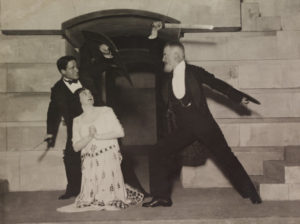In my latest “Sightings” column, which appears in the online edition of today’s Wall Street Journal, I talk about one of the reasons why George Bernard Shaw is no longer widely appreciated as the great writer he was. Here’s an excerpt.
* * *
Plays are meant to be seen on a stage, not read off a page. That may sound like a truism, but you can’t know how true it is until you’ve seen a few of them. And while watching a film or TV version of a great play (like, say, Mike Nichols’ 1966 adaptation of “Who’s Afraid of Virginia Woolf?”) can be a surprisingly effective substitute for the real thing, most people don’t even get that far with classical theater. If you only know Shakespeare from the classroom, you’re likely to believe that his plays are snoozefests in which prissy men in tights strut around saying “prithee” and “forsooth.” In fact, most of them are swashbuckling blood-and-guts tragedies in which as Howard Dietz pithily observed in “That’s Entertainment,” “a ghost and a prince meet/And everyone ends in mincemeat.”
 If anything, George Bernard Shaw has suffered even more from the gap between page and stage. Throughout the last part of his long life, Shaw was a full-fledged international celebrity. Twenty of his plays were produced on Broadway between 1940 and 1960, many more than once, and some were also made into big-budget films with big-name casts. (The 1959 movie of “The Devil’s Disciple” starred Kirk Douglas, Burt Lancaster and Laurence Olivier.) Today, though, most people know him from “My Fair Lady,” Lerner and Loewe’s musical version of “Pygmalion,” and nothing else. To the extent that people under 60 know anything about his plays, they typically assume that they’re droningly intellectual….
If anything, George Bernard Shaw has suffered even more from the gap between page and stage. Throughout the last part of his long life, Shaw was a full-fledged international celebrity. Twenty of his plays were produced on Broadway between 1940 and 1960, many more than once, and some were also made into big-budget films with big-name casts. (The 1959 movie of “The Devil’s Disciple” starred Kirk Douglas, Burt Lancaster and Laurence Olivier.) Today, though, most people know him from “My Fair Lady,” Lerner and Loewe’s musical version of “Pygmalion,” and nothing else. To the extent that people under 60 know anything about his plays, they typically assume that they’re droningly intellectual….
The open secret of Shaw’s plays is that most of them are funny—not merely clever or witty, but laugh-out-loud funny. They’re full of good jokes, razor-sharp repartee and school-of-Wilde epigrams worthy of the master. Take, for example, “The Devil’s Disciple,” in which martyrdom is described as “the only way in which a man can become famous without ability.” Or “Major Barbara,” in which the villain, an arms dealer, utters this splendidly absurd pronouncement: “My religion? Well, my dear, I am a Millionaire. That is my religion.” Such lines may not look particularly funny in print, but they never fail to detonate with terrific comic effect when spoken out loud.
Why did a political propagandist like Shaw write comedies? Because he was a propagandist, one shrewd enough to know that he had to be amusing to get people to listen to his controversial ideas….
* * *
Read the whole thing here.
A scene from the 1938 film version of Pygmalion, starring Leslie Howard and Wendy Hiller, adapted for the screen by Shaw, and directed by Anthony Asquith and Howard:
Shaw talks about Russia and the United States in a 1937 radio broadcast filmed by British Movietone News:
